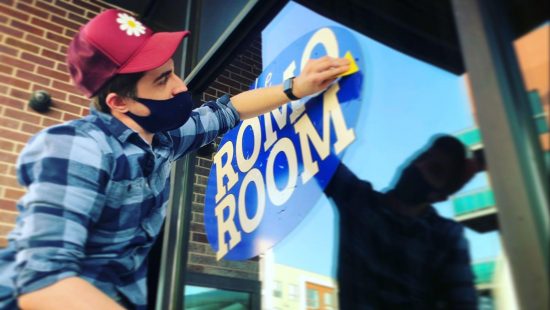
Rob Morris - Architect of His Realm
May 2, 2021
Nathan Clingan
 Valerie Lopez
Valerie Lopez
 Valerie Lopez
Valerie Lopez
I’m in the middle of a Game of Thrones rewatch, so I have a lot of Lannister and Stark and Targaryen on the brain these days. When seeking inspiration for the article about Rob Morris, I quickly landed on Tyrion Lannister.
Among the many situations that Tyrion got himself out of, one stands out to me. Tyrion comes to the House of Tully under the capture of the Stark family. Tyrion comes with many great credentials (he is a Lannister, after all, with their hold on the throne and promise to always pay their debts), and he is brought to trial. In a move of brilliance, Tyrion asks for a trial by combat (a move everyone expects will result in the “little man flying” through the moon door). Lo and behold, Tyrion seeks a volunteer to fight Lysa Arryn’s designated knight and Bronn steps forward and ultimately, emerges victorious, securing Tyrion’s victory. Tyrion’s unconventional strategy pays off. And in a final capstone to the scene, Tyrion tosses a bag of gold to the guard who held him in the sky cells prior to the trial by combat. Honoring his word, emerging not only victorious but with a loyal advocate in Bronn, and leaving behind many in shock that an incredibly bold move would succeed.
If you don’t see the parallel between this scene and Rob Morris, then you may not have been paying attention to what Morris has been doing since returning to his hometown of Austin in the Fall of 2019. Armed with impressive credentials (but sans the bags of gold) such as production staff of Dancing with the Stars, Botched, and Big Brothers, Morris returns to Austin with a wild and bold idea for the Austin comedy scene: a pay-to-play open mic venue. If you’ve been a part of the Austin comedy scene for years, then you know, the reception to Morris’ idea might not be kind (and indeed wasn’t). Perhaps not as brutal as a threat to make Morris fly through a moon door, but it was a difficult time nonetheless.
But let’s start with the prequel to Morris’ return to Austin. Language, performance, and specifically theater, were a part of Morris’ life since he was a teenager. With varying levels of success, he might say, but enough that he wanted to pursue a degree in the arts. He settled on the University of North Carolina School of Arts (UNCSA). His love of language is subtly apparent if you listen carefully to his word choice or his ability to set the scene for a story he tells. It is not that he is trying to impress with his vocabulary, but rather he is using vocabulary to punch up a story.
His admiration and consumption of comedy began at an early age — he admired so many of the classic names of comedy, Rock, Carlin, Oswalt, but if he heard a new name, he’d seek out their albums to soak in the words and the language being conveyed through comedy. He was trying to seek out a bigger lesson from studying comics and albums, too. “It wasn’t even like I’m trying to be a comedian. It was like, I’m trying to be a person. I’m just trying to become a human,” Morris says, recalling a time that hearing David Cross speak about the Bush administration changed his own political worldview.
An interesting level of self-awareness emerges during his conversation with me. Most notably that “I have this thing about starting projects and continuing projects. Long term is not me,” which is refreshing to hear someone admit. Most people are not willing to admit they can’t stay with projects long term, but Morris turns that to mean he likes short, impactful projects, which is part of why he really thrived in Los Angeles and New York working for major television productions because everything was based on a season. A very quick, intense season where you give it your all, then move on to another new show or new season to repeat the cycle, but under a “brand new” guise.
One such new project was trying his hand at standup comedy. Despite his many years as a comedy fan, it wasn’t until a speaking opportunity at funeral service (we will encourage you to listen to the podcast to hear this one, it’s a classic) that he realized all those years of listening to language, performing, and providing entertainment to an audience could come together in the form of standup. He waited 10 years and finally decided to tackle the LA standup comedy grind. He set aggressive goals for himself, but he was at a crossroads and perhaps realized standup was another project. Three years into being active in comedy, he set a goal of performing every night for a month to see how he felt about continuing “the project” after that; at the end of the month, he decided “nope, don’t like it.” And with that, Rob Morris realized he didn’t want to make standup his permanent full-time job. Hobby, yes, but not the frenetic pace of multiple shows per night every night of the week, in the hopes you could be one of the lucky ones that lands a Netflix special.
Which conveniently brings us to a brand new project Morris wanted to tackle. Family in Austin needed him back home, and he needed a source of income. Much like he had absorbed years of listening to comedy growing up, he had absorbed the notion that something interesting (and successful) existed in LA that didn’t exist in Austin — the pay-to-play open mic model. If you’ve ever looked at the Comedy Bureau’s comedy calendar for LA, you would know that the amount of shows and open mics is overwhelming. Add to that traffic, then sure, paying $5 for a guaranteed opportunity to do a 5 minute set – and only having to commit to an hour-long show – can be a godsend.
Morris knew what the Austin comedy scene had to offer and he knew he had a viable idea, and this is where, you really need to listen to the podcast, because he talks about being excoriated for bringing his idea to Austin in December of 2019. His idea was attacked and he was personally attacked. All on top of dealing with a difficult family health situation which he didn’t want to broadcast. “you don’t necessarily want to say, I’ve got this really troubling personal thing happening. Please take sympathy on me and embrace my business model,” Morris states.
But Morris didn’t give up. He continued to think creatively and he earned some very loyal supporters of the pay-to-play open mic model in those early days, some of whom have remained loyal to this day. Since then, he rebranded the name of the room to the ROMO ROOM (a nod to his father), and eased up on the pay-to-play model by encouraging donations and adding the option to purchase a recording of the set you perform for $10.
Morris and I talk a lot about the inclusive versus exclusive elements to the Austin comedy scene and how by challenging certain establishments and established ways of doing things the result was far more inclusion. His model of giving comics a chance to perform every single night of the week if they wanted was how he knew he could encourage a stronger comedy scene. He references a quote by entrepreneur Gary Vaynerchuk that says “There are two ways you can ‘build the tallest building in town’. You can either spend all your time and energy focusing on you making your building the tallest, or you can go around and try to tear everyone else’s building down.” And Morris knew in those earliest days back in Austin, he wanted to build the tallest building, he wasn’t interested in tearing anyone else’s down. He wanted more stage time for more people. exclaiming “it’s better when there’s more abundance, you know, high tides raise all ships. I’m like a fucking cliché. But it’s true.”
For years, Morris has been a fan of Dov Davidoff. A hardcore fan with capital‑H. He got a poster of a Davidoff album during his time at Viacom in 2013. When he opened the ROMO ROOM (now it’s in new home at The Brass Tap in the Domain) in the fall of 2020, he lined the walls of the room with posters of many comics, including Davidoff’s. It was a heartfelt moment when Davidoff headlined the ROMO ROOM and signed the poster along the wall. The admiration came through, but also the sense of vindication that through all the challenges of opening his original venue to having his poster signed by a headlining comic at the ROMO ROOM, his persistence paid off. And among his closing comments, he shares “I don’t even need the tallest building. Can we just have a building? Can we just participate?” And he’s gotten the notice of some very high-profile Austinites. In fact, a recent high-profile transplant from LA, Joe Rogan, mentioned the ROMO ROOM as part of a conversation about the Austin comedy scene. A moment that Morris is still stunned by, but is quick to add the work of Brandon Lewin of Big Laugh Comedy and Marty Clarke at The Creek and the Cave as among the “other builders of buildings” in the comedy scene.
What’s next? Morris says “I like to bake. I like to make it what it is. And I’m much more of like, build the ship and let it set sail.” With a thriving the ROMO ROOM, a recent engagement, and a plate brimming, there are plenty of projects to choose from. And a strong penchant for baking cakes and building buildings. Just don’t ask him to fly through any more trials by combat. Metaphorically, of course.
Rob can be seen:
- At the ROMO ROOM Comedy Club
Follow Rob Morris and the ROMO ROOM Comedy Club
- Website — theromoroom.com
- Twitter — @theromoroom
- Instagram — @robmorrisyo /// @romoroomatx
- Facebook — Facebook.com/RobMorris /// Facebook.com/theROMOroom
- Do 512 — Do512.com/the-ROMO-room
- Youtube — Youtube.com/RobMorris /// Youtube.com/theROMOroom
 Valerie Lopez
Valerie Lopez
 Valerie Lopez
Valerie Lopez

